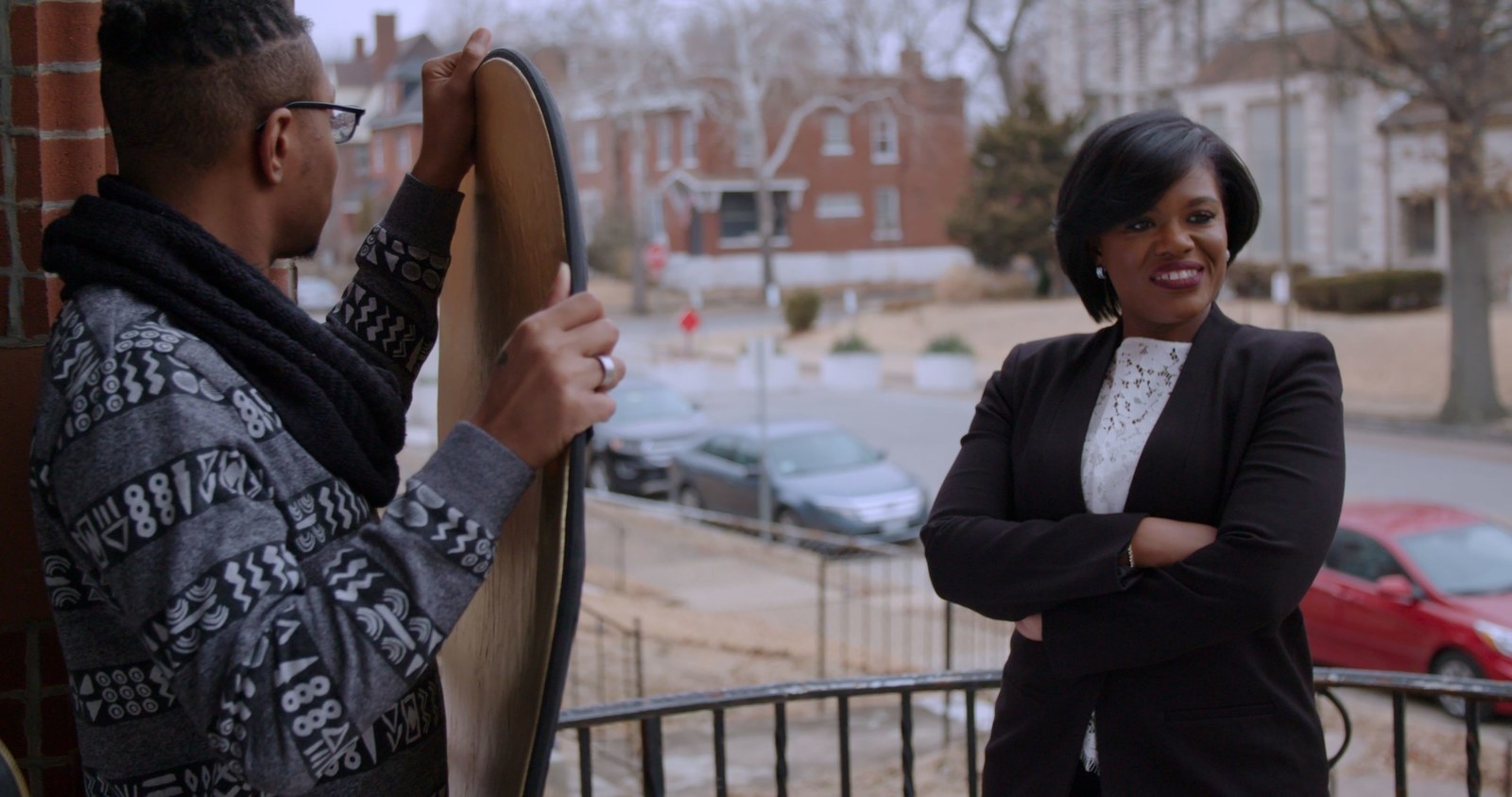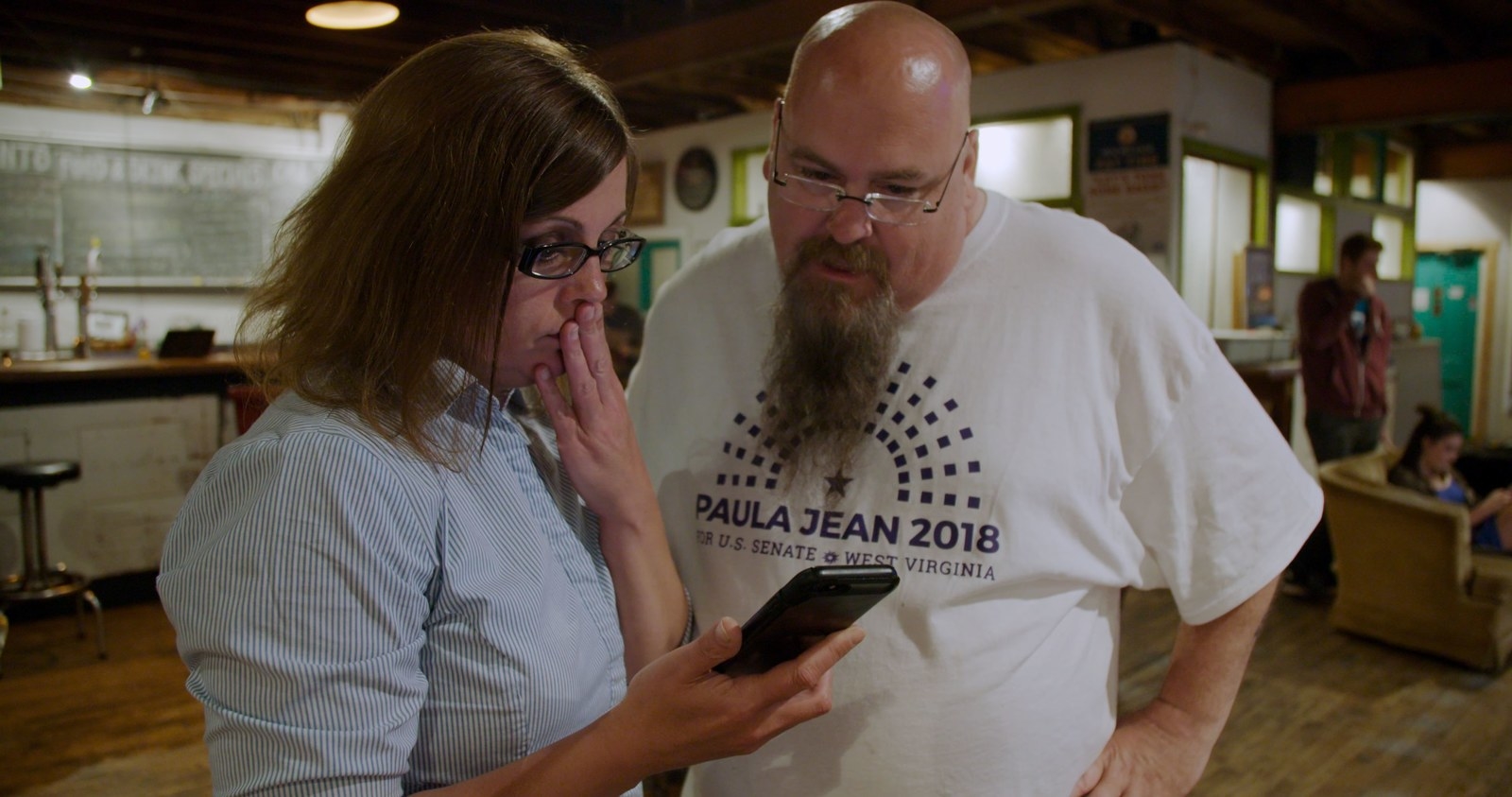This New Documentary Shows Alexandria Ocasio-Cortez Before She Was AOC
“How do you prepare for something you don't know is coming?" Alexandria Ocasio-Cortez asks in the opening scenes of the new, eminently watchable Netflix documentary Knock Down the House. Directed by Rachel Lears, whose previous film followed workers organizing at a New York bakery, the movie chronicles the stories of four women candidates challenging powerful congressional Democratic incumbents in the 2018 midterm elections.
Ocasio-Cortez delivers that line as she thinks out loud about the tough election battle ahead against Joe Crowley, then the fourth-highest-ranking Democratic member of the House of Representatives. She’s putting her makeup on in the bathroom, in one of many such intimate moments captured by the film. The scene foreshadows what came after, as she — spoiler alert — became the only candidate followed by the documentary who ultimately beat her opponent. The entire world saw her live reaction to that victory, and her triumph — from her surprised face to the shoes she wore out through campaigning — became iconic, a symbolic reclamation of the possibilities of grassroots activism, and a slap in the face to the kind of establishment centrism represented by Crowley.
Since then, Ocasio-Cortez has become one of the leaders of a new class of leftist Democrats, an obsessive object of Fox News ire, a Twitter clapback queen, and an international celebrity of pop star proportions. The Netflix documentary is already being marketed and making headlines for its most noteworthy aspect — the intimate glimpses we get of now-iconic AOC’s life before politics, and the flashes of the behind-the-scenes work that led up to her becoming a Time magazine cover subject.
The film’s strength is the glimpses it offers into all of its subjects’ personal journeys. But it’s also limited by how neatly its telling of these stories hews to the same media narratives that emerged after it was filmed. Rather than providing any new insight into the races — such as why, say, Ocasio-Cortez won, while the other candidates lost — or using all the women’s stories to explore the workings of gender (and race and class) in electoral politics, Knock Down the House takes a simpler, safer route: getting up close and personal with the women running those races, especially the one who’s already captured the public imagination.

Netflix
Alexandria Ocasio-Cortez in Knock Down the House.
Knock Down the House was shot before AOC became the Beyoncé of politics, and it’s not just about her. The documentary follows three other challengers recruited by the Justice Democrats and Brand New Congress, organizations created to take on establishment Democrats in the wake of Bernie Sanders’ 2016 campaign. (The filmmaker was initially focused on those activist groups.) The other candidates are Paula Jean Swearengin, a coal miner’s daughter taking on Sen. Joe Manchin in West Virginia; Cori Bush, a black nurse and ordained pastor who ran for a St. Louis seat in the aftermath of the Ferguson protests in 2014; and Amy Vilela, a Latinx Nevada mother who got into politics after her daughter died because of preventable health care system failures.
But to the extent that politics is show business, Ocasio-Cortez is the film’s star. It opens and closes with her, and is ultimately most focused on fleshing out the media flash points of her story, with vignettes of the other women’s stories interspersed throughout. The cumulative effect is a series of moving and compelling portraits about the emotional and personal impetus behind their entries into politics. But because the documentary doesn’t fully commit to either approach — deep diving into the Ocasio-Cortez race, or giving the other women’s stories equal weight — the analysis of the campaigns and politics don’t move beyond the level of cable TV soundbites.
The documentary does provide snippets of some of the behind-the-scenes mechanics through which the Justice Democrats and Brand New Congress recruit, vet, and support candidates. (“She is pretty doggone stellar," we hear about one prospect.) That recruitment is a routine — though rarely seen — political process that, in the case of Ocasio-Cortez, has sparked comical conspiracy theories that she is an actor hired to play a congresswoman.
Ocasio-Cortez’s win had a Hollywood-style symbolism, and for many reasons, one of which was the media-ready narrative that it presented, in part by design: old, establishment white guy versus Latinx, millennial woman. That stark binary was media catnip in a way that none of the other matchups were. But that doesn’t necessarily mean it was the most interesting or instructive race out of all the ones featured in the documentary.

Netflix
Cori Bush in Knock Down the House.
Cori Bush, for instance, who gets the least amount of space in the film, arguably faced the most fascinating opposition. She was a working-class black woman taking on a black family dynasty that had been governing her St. Louis district since 1969. The intracommunity, generational, and class divisions that such a campaign exposed could be a very rich story in itself. But it doesn’t resonate as “universal” in the same way as the Ocasio-Cortez matchup, and Bush’s story is relegated to a couple of scenes where she faces pushback from voters who prefer to vote for an established, senior congressman.
The documentary’s main selling point is the access and footage it offers, which mostly focuses on the power of Ocasio-Cortez’s charisma and life story. We see Ocasio-Cortez in a piano recital as a child; we see a cute scene of her mockingly fighting over ice cream with her boyfriend; we hear her mom’s stories about her childhood determination. The film contextualizes her biographical background, which became an object of controversybecause, as she herself explains, her family moved to the suburb of Yorktown to access a better school district, one where no one else looked like her and she struggled to find community. It also gives intimate glimpses into Ocasio-Cortez’s mindset during her campaign — those #relatable moments she’s become famous and beloved for. “I need to take up space, I need to take up space,” she chants, like a mantra, before the televised debate with Crowley last June that helped put her on the radar of national media.
To the degree that the film does a deep dive into Ocasio-Cortez’s campaign, the beginning stages of canvassing, and the footage from the early debates, are all instructive about the more humdrum grassroots work of local politics. They also highlight the power Crowley wielded as an old-school Queens politician with influence over hiring and political spoils. He initially didn’t even show up to their scheduled community debates, and then started appearing in parades and agreed to debates — including the one televised on NY1 — as the election began to heat up. There’s a shot of Ocasio-Cortez’s rapidly increasing Facebook numbers, and at another point she mentions that her campaign video going viral helped with fundraising.
But none of this is contextualized to tease out its wider implications. Is her campaign’s social media savvy one of the reasons why she ultimately seemed to struggle less with fundraising than the other candidates? What were some of the dynamics of these different races, or the inner workings of the campaigns, that contributed to the different outcomes? These questions about the mechanics are not raised or explored. The relationship between Vilela and her staffers, including her manager, is another interesting — and poignant — subplot that the film doesn’t dive into.
Instead, we get the exciting footage of Ocasio-Cortez right before she bursts into her election night party. The final, moving scene features her reminiscing about her father in front of the capitol, as she remembers a road trip he took her on there, and how he taught her that all those monuments belonged to everyone — and to them. It richly resonates with the symbolism of Ocasio-Cortez’s vision. “The last thing my dad ever told me was to make him proud,” she says, “and I finally think I did, I hope.” As her life and political victory come full circle, so does the documentary.
We also get a powerful sense of the emotional carnage of the other women’s losses. Sen. Joe Manchin’s smarmy “talk to my assistant to set up a meeting” phone call to Swearengin after her loss really captures the triumph of business as usual. A scene where Vilela’s husband and children join her on a couch as she weeps is especially touching. “Many of you called for change after Ferguson; it does not look like that is happening,” we hear from a cable news anchor in a voiceover to explain Bush’s loss.
Ultimately, the focus is on the emotional and “human interest” aspects of these stories, and there is little sense of grappling with why three of these candidates lost, or why Ocasio-Cortez specifically won. Which isn’t necessarily surprising; beyond the media glitz, Ocasio-Cortez’s victory turned out to be, in large part, a result of the unsexy fact of increased voter registration and participation in gentrifying neighborhoods in Queens. And that reality doesn’t make for the most gripping film content.

Netflix
Paula Jean Swearengin, who ran for a Senate seat in West Virginia.
“We work harder in these races just ’cause we’re women, we’re not rich white dudes in suits,” Swearengin says at one point. It’s a comment taken out of what appears to be a lively conversation among the recruits, and seems to be one of the themes the filmmaker wants to highlight. So much of the controversy over Ocasio-Cortez’s celebrity, from her fashion choices to her life story, has been about the intersections of gender with race and class.
But Knock Down the House could have been an even more interesting film if it had highlighted that question of identity in politics as a structuring theme, how it influences narratives and voters and fundraising, rather than relegating the idea to something mentioned in passing. (In the film’s opening scene, Ocasio-Cortez mentions the ease of male politicians’ wardrobes, and in another aside as she walks on a street, she mentions how her voice goes up two octaves when she’s trying to be polite.) And the documentary seems intent on grouping all four women together, rather than exploring the differences in their experiences. Since Ocasio-Cortez’s win, for instance, her fellow freshman congressional representative Ilhan Omar, a black Muslim woman, has experienced a very different media reception.
Ocasio-Cortez herself has warned against the pitfalls of celebrity narratives in representing progressive movements. “I was invited on this TV show and before I went on they were like, 'the defining star of the progressive movement,' and I was like, 'Noooo!'” she told Elle after her election win. “There is no one person.” In using her story as the symbolic tale that the media has already designated it, Knock Down the Housemissed an opportunity to add nuance to our understanding of the forces that helped her win — or the other women lose. Success stories make us feel good, but this kind of celebratory exceptionalism inherently overlooks so much. Still, it’s a reminder of how rare it is to get a clear, sustained look at any women in politics, and a credit to the film’s unique perspective and fascinating protagonists, that it leaves you wanting more, not less. ●
This New Documentary Shows Alexandria Ocasio-Cortez Before She Was AOC
![This New Documentary Shows Alexandria Ocasio-Cortez Before She Was AOC]() Reviewed by Your Destination
on
May 04, 2019
Rating:
Reviewed by Your Destination
on
May 04, 2019
Rating:

No comments